A Getting around
| drive a car |
| ride a bicycle / bike |
| ride a motorcycle |
| take a taxi / cab |
| take the bus |
| take the subway |
| take the train |
| walk |
| describe |
| husband |
| wife |
| kid |
| family |
| member |
| city |
| extra |
| information |
| son |
| daughter |
1 Vocabulary Ways of getting around
A Listen and repeat.
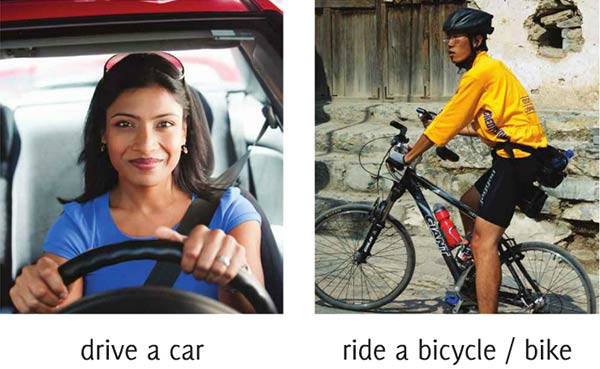
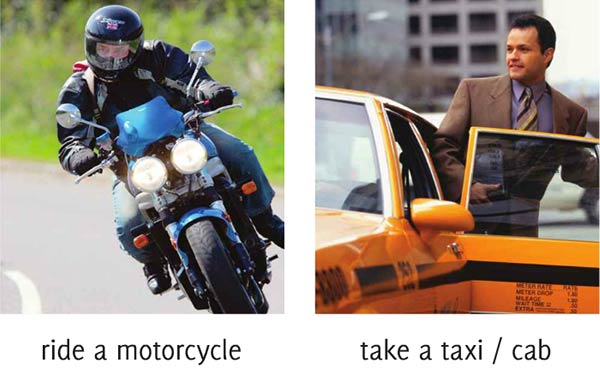
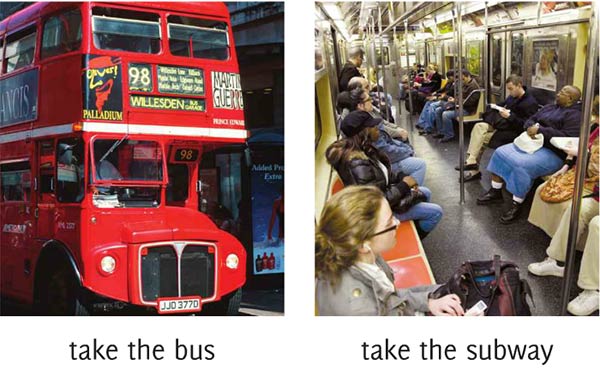
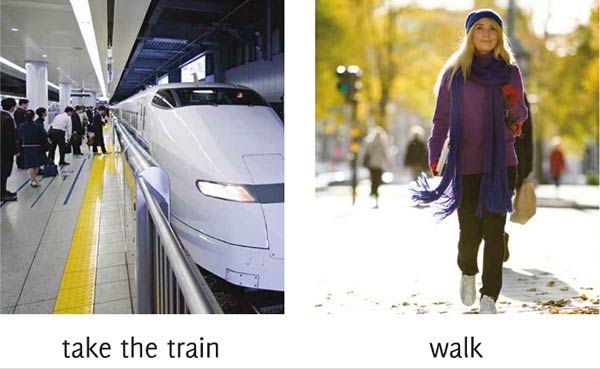
Script:
Unit 4, Daily life, Lesson A, Getting around
Page 36, Exercise 1, Vocabulary, Ways of getting around, Part A
drive a car
ride a bicycle / ride a bike
ride a motorcycle
take a taxi / take a cab
take the bus
take the subway
take the train
walk
B Listen to five ways of getting around. Number them from 1 to 5.
- a bicycle
- a bus
- a car
- a motorcycle
- a train
Script:
Part B
1. [a bus]
2. [a bicycle]
3. [a motorcycle]
4. [a car]
5. [a train]
2 Language in context Going to work and school
A Listen to Mareila describe how she and her family get to work and school. Underline the ways the get around.
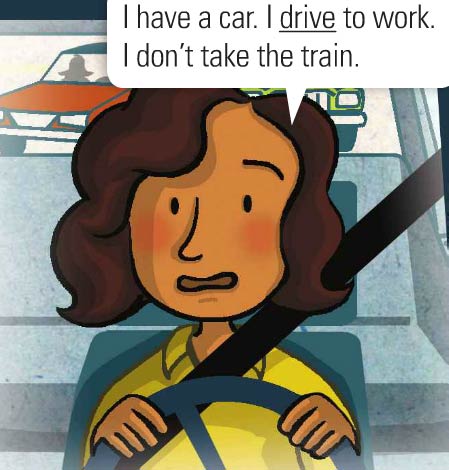
I have a car. I drive to work.
I dont't take the train.
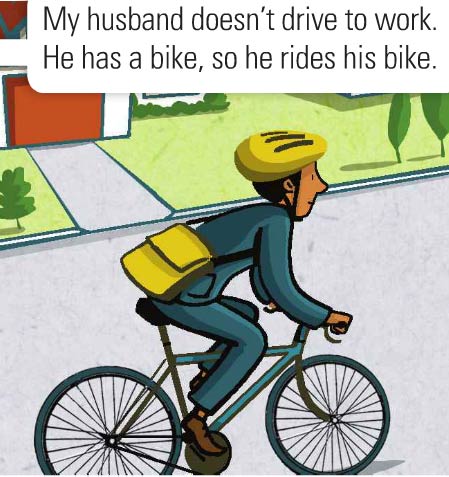
My husband doesn't drive to work.
He has a bike, so he rides his bike.
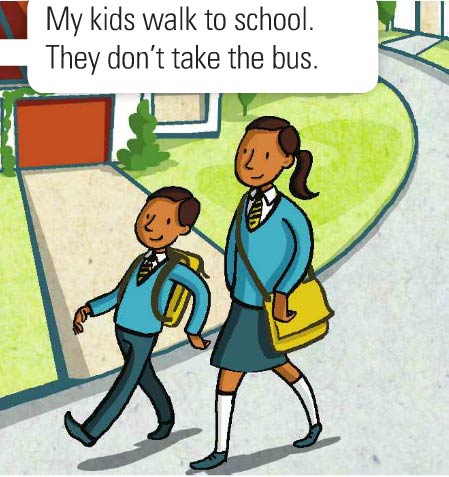
My kids walk to school.
They don't take the bus.
Script:
Page 36, Exercise 2, Language in context, Going to work and school
MARIELA: I have a car. I drive to work. I don't take the train.
My husband doesn't drive to work. He has a bike, so he rides his bike to work.
My kids walk to school. They don't take the bus.
B What about you? Check (✔) the ways you get around.
- I drive.
- I take the bus.
- I ride a bike.
- I walk.
3 Grammar Simple present statements
| Regular verbs | |
| I drive to work. | I don't take the train. |
| You take a taxi. | You don't take the subway. |
| He rides a bike. | He doesn't drive to work. |
| She drives. | She doesn't walk. |
| We take the train. | We don't take a taxi. |
| They walk to school. | They don't take the bus. |
| Irregular verbs | |
| I / you / we / they | he / she / it |
| I have a car. | She has a car. |
| You don't have a bike. | She doesn't have a bike. |
| We go to work. | He goes to work. |
| They don't go to school. | He doesn't go to school. |
| Contractions don't = do not doesn't = does not |
Script:
Page 37, Exercise 3, Grammar, Simple present statements
Regular verbs:
I drive to work. / I don't take the train.
You take a taxi. / You don't take the subway.
He rides a bike. / He doesn't drive to work.
She drives. / She doesn't walk.
We take the train. / We don't take a taxi.
They walk to school. / They don't take the bus.
Irregular verbs:
I / you / we / they:
I have a car.
You don't have a bike.
We go to work.
They don't go to school.
he / she / it:
She has a car.
She doesn't have a bike.
He goes to work.
He doesn't go to school.
Contractions:
"don't" equals "do not"
"doesn't" equals "does not"
A Complete the sentences with the simple present forms of the verbs. Then compare with a partner.
- I (take) the bus to school. I (not / walk).
- Jonathan (have) a car. He (drive) to work.
- My parents (take) the train to work. They (go) to the city.
- My neighbor (ride) a motorcycle to work.
- Mei-li (not / take) the bus. She (walk).
- We (not / have) bicycles, and we (not / drive).
B Pair work Make five sentences about how your family members and friends get to school or work. Tell your partner.
A: My sister works in a big city. She takes the bus to work.
B: My best friend works in a big city, too. He doesn't the bus. He drives.
4 Speaking I take the bus.
A Write how you get to school or work in the chart. Add extra information, such as a bus number or a train number.
| Me | Name: | Name: | Name: | |
| To school | ||||
| To work | ||||
| Extra information |
B Group work Find out how three of your classmates get to school or work. Complete the chart with their information.
A: I take the bus to school. It's the number 16 bus. How about you?
B: I take the bus, too. I take the number 8 bus.
C Group work Tell another group how your classmates get to school or work.
"Daniel takes the number 8 bus to school."
I can describe how people get around.
There are 12 Comments
در بخش گرامر مثلاً نوشته برای
در بخش گرامر مثلاً نوشته برای bus از فعل take استفاده میشه. حالا میشه به جای این فعل در جمله از فعل go یا رفتن استفاده کنیم و قبل از bus از حرف اضافه ی by استفاده کنیم؟
"I take a bus." or "I go to work by bus"
و اگه بخوایم بگیم پیاده میرم میشه به جای walk از foot استفاده کنیم؟
I walk to school.
I go to school on foot.
- Log in to post comments
دقیقاً همینطوره و همه ی جملات
دقیقاً همینطوره و همه ی جملات شما صحیحه. این درس یکی از 200 درس دوره ی آموزشی Four Corners هست که شما رو با روش های رفت و آمد آشنا میکنه. طبیعتاً جورهای دیگه هم میشه این جملات رو بیان کرد. طبیعتاً شما این فرم ها رو در درس های دیگه خواهید دید. همونطور که در فارسی میگیم:
- با اتوبوس رفتم.
- اتوبوس گرفتم.
- از اتوبوس استفاده کردم.
- پیاده رفتم.
- راه رفتم.
- با پاهام رفتم!
و شاید فرم های دیگه که به ذهن من نمیاد، در انگلیسی هم برای بیان هر function یا کاربرد، فرم های مختلفی وجود داره. بخش function و form سایت با نام کاربرد های زبان در حال تکمیل شدن هست که میتونید از اون طریق متوجه بشید که مثلاً برای موافقت یا مخالفت کردن چه جمله هایی به کار میره. دیکشنری Longman Activator یک مرجع عالی برای سوال شماست. این دیکشنری در مورد فعل هایی که برای جابه جا شدن به کار میره میگه:
different ways of travelling
drive / draɪv / [ intransitive verb ] to travel in a car :
▪ ‘How are you going to get there?’ ‘I’m driving.’
drive to/from
▪ Jenny drove to the coast for the weekend.
fly / flaɪ / [ intransitive verb ] to travel by plane :
▪ My mother never liked flying.
fly to/from etc
▪ We’ll be flying from New York to Munich.
sail / seɪl / [ intransitive verb ] to travel by boat or ship :
▪ We sail first thing in the morning
sail to/from
▪ He sailed from Southampton on May 6th.
by car/boat/plane/train / baɪ ˈkɑːʳ, ˈbəʊt, ˈpleɪn, ˈtreɪn / [ adverb ] travelling in a car, boat, plane, or train :
▪ ‘Did you come by car?’ ‘No, by train.’
▪ Some of the beaches can only be reached by boat.
▪ We didn’t have much time, so we decided to go by plane.
on foot / ɒn ˈfʊt / [ adverb ] if you go somewhere on foot , you walk there :
▪ The two men had attempted to cross the mountains on foot.
take / teɪk / [ transitive verb ] if you take a train, bus, or plane, you travel in it :
▪ What’s the best way to get downtown? Should I take a bus?
▪ Take the subway to Montgomery Station and walk from there.
by air/by sea/by land / baɪ ˈeəʳ, baɪ ˈsiː, baɪ ˈlænd / [ adverb ] if you travel by air , by sea , or by land you travel by plane, in a boat, or on land :
▪ It’s much quicker if you go by air, but it’s also more expensive.
▪ Troops entered the region by land and sea.
overland / ˌəʊvəʳˈlænd◂ / [ adverb ] by train, car, bus etc, especially over a long distance, when people would normally go by plane or ship :
▪ It’s certainly quicker to fly but we thought it would be more exciting to go overland.
overland [ adjective only before noun ]
▪ The overland route is very difficult at times.
hitchhike/hitch also hitch a ride American / ˈhɪtʃhaɪk, hɪtʃ, ˌhɪtʃ ə ˈraɪd / [ intransitive/transitive verb ] to travel by standing by the side of the road asking people in cars to stop and take you to the place you want to go :
▪ He lost all his money in a casino in Vegas and had to hitchhike back to San Francisco.
▪ We hitched a ride with a trucker who took us all the way to the Virginia border.
▪ It’s a lot cheaper to hitch but it’s also more dangerous.
backpacking / ˈbækˌpækɪŋ / [ uncountable noun ] the activity of travelling independently to a lot of different areas, carrying your clothes etc in a special bag on your back :
▪ Backpacking is especially popular among students and young people.
▪ a backpacking trip
go backpacking
▪ Last year, he went backpacking in the US.
Longman Language Activator
- Log in to post comments
خیلی ممنون از پاسخ کامل و
خیلی ممنون از پاسخ کامل و جامع شما و همینطور برای زحمات شبانه روزی شما و تیم لنگوئج تایز.
بیصبرانه منتظر تکمیل بخش کاربردهای زبان هستم.
بهترین ها رو براتون آرزو دارم. :گل :)
- Log in to post comments
فقط میتونم بگم فوق العاده است
فقط میتونم بگم فوق العاده است.
موفق باشید.
- Log in to post comments
شما هم فوق العاده اید! خیلی
شما هم فوق العاده اید! خیلی ممنون!
- Log in to post comments
A: I take the bus to school.
A: I take the bus to school. It's the number 16 bus. How about you?
B: I take the bus, too. I take the number 8 bus.
- Log in to post comments
I drive to office but I ride
I drive to office but I ride a bike to school.
- Log in to post comments
ممنون از پیاده سازی مطالب
ممنون از پیاده سازی مطالب آموزشی به این نحو ![]() واقعا مفید وخلاصه شدست مطالبتون.
واقعا مفید وخلاصه شدست مطالبتون.
- Log in to post comments
سلام لطفا به فارسی روش ساخت
سلام لطفا به فارسی روش ساخت جمله به زبان حال ساده رو توضیح دهید و انواع روش ها و مثالم بزنید مثلا اول فاعل بعد فعل و ممنون میشم
- Log in to post comments
گرامر زمان حال ساده در زبان
گرامر زمان حال ساده در زبان انگلیسی را میتوانید بطور کامل مطالعه کنید.
- Log in to post comments
بسیار عالی بود ممنون از زحمات
بسیار عالی بود ممنون از زحمات شما
- Log in to post comments
